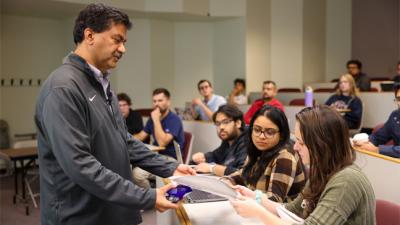News

Six RPI students have been awarded fellowships from the National Science Foundation’s Graduate Research Fellowship Program (GRFP).

Jonathan Dordick, Ph.D., Vice President for Strategic Alliances and Translation and Institute Professor of Chemical and Biological Engineering at Rensselaer Polytechnic Institute (RPI), has recently received two prestigious honors.

We all know how a bad night’s sleep can affect how we feel. In fact, the disruption of our sleep has been implicated at many levels of human disease, including cancer, diabetes, heart disease, and disorders associated with aging.

Rensselaer Polytechnic Institute students will have the opportunity to meet with and learn from forensic scientists and other professionals from the New York State Police (NYSP) Crime Laboratory System at 2 p.m. on March 26 at the Shirley Ann Jackson, Ph.D. Center for Biotechnology and Interdisciplinary Studies.

Heparin, the world’s most widely used blood thinner, is used during procedures ranging from kidney dialysis to open heart surgery. Currently, heparin is derived from pig intestines, but scientists at Rensselaer Polytechnic Institute have discovered how to make it in the lab.

Researchers from Rensselaer Polytechnic Institute (RPI) will use hemp to
develop a commercially viable, durable, and low-embodied-carbon insulated siding product to
address what the U.S. Green Building Council says is a “crucial need for building retrofits to
improve energy efficiency and reduce carbon emissions.”

Just shy of 50 teams of students from area high schools and around the world will compete at the 2024 New York Tech Valley FIRST ® Robotics Competition at MVP Arena March 22-23, 2024. Inventor Dean Kamen founded FIRST® (For Inspiration and Recognition of Science and Technology) in 1989 to inspire an appreciation of science and technology in young people.

Just shy of 50 teams of students from area high schools and around the world will compete at the 2024 New York Tech Valley FIRST ® Robotics Competition at MVP Arena March 22-23, 2024. Inventor Dean Kamen founded FIRST® (For Inspiration and Recognition of Science and Technology) in 1989 to inspire an appreciation of science and technology in young people.

Rensselaer Polytechnic Institute Develops New Courses in Semiconductors in Partnership With Industry
With the CHIPS and Science Act, the United States’ commitment to becoming a global leader in semiconductor manufacturing once again was formalized.

Steve Eshiemogie, a doctoral student studying chemical and biological engineering at Rensselaer Polytechnic Institute, has been recognized as an honorable mention in the annual Cell Press Rising Black Scientists Awards for his essay “From village to lab: An African scientist’s quest for a sustainable future.” [MS1] More than 350 students across a range of scientific disciplines appl
